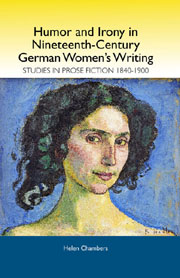Book contents
- Frontmatter
- Contents
- Acknowledgments
- Introduction
- 1 Annette von Droste-Hülshoff and Ida Hahn-Hahn: Overcoming Seriousness?
- 2 Ottilie Wildermuth and Helene Böhlau: Harmless Humor or Subtle Psychology?
- 3 Marie von Ebner-Eschenbach: Satire, Physical Comedy, Irony, and Deeper Meaning
- 4 Ada Christen and Clara Viebig: Laughter and Pain in the World of Work
- 5 Isolde Kurz and Ricarda Huch: The Humor of Skeptical Idealism
- Conclusion
- Works Cited
- Index
Conclusion
Published online by Cambridge University Press: 05 February 2013
- Frontmatter
- Contents
- Acknowledgments
- Introduction
- 1 Annette von Droste-Hülshoff and Ida Hahn-Hahn: Overcoming Seriousness?
- 2 Ottilie Wildermuth and Helene Böhlau: Harmless Humor or Subtle Psychology?
- 3 Marie von Ebner-Eschenbach: Satire, Physical Comedy, Irony, and Deeper Meaning
- 4 Ada Christen and Clara Viebig: Laughter and Pain in the World of Work
- 5 Isolde Kurz and Ricarda Huch: The Humor of Skeptical Idealism
- Conclusion
- Works Cited
- Index
Summary
HARRIET MURPHY VOICES A WIDELY HELD VIEW when she refers to the “massive dearth of amusing literature in German.” On the other hand, given the fact that comedy is bound to mores and societal norms and that humor and irony are recognized weapons of the weak when deployed against the forces of power and authority, it should not be surprising that this study of nineteenth-century women's writing in German has found plenty to laugh at in a bourgeois age when social constraints, particularly on women, were tight and widely imposed legally, politically, and by a culture of social consensus discursively constructed in contemporary writings on popular science, manners, and education. The socio-economic importance of marriage for social cohesion in a period when women were more likely to be objects of trade and barter than agents and autonomous subjects gave rise to fictional situations in which games of sexual politics are played out with serious as well as humorous consequences. As Ragnar Johnson observes, “Das Komische setzt eine sich selbst stabilisierende Ordnung von Begriffssystemen als Paradigma einer allgemeinen kognitiven Ordnung voraus.” In many of the works considered, this order is the socio-economic order that regulates the marriage market and determines the power relations between the sexes. Many women's texts challenge and adapt the norms, provoking what George Meredith in a nineteenthcentury English context calls “thoughtful laughter.”
Satire and the Norm
What has emerged in this study of a representative selection of narratives by important German and Austrian women writers in the age of realism is that there is a considerable body of satirical writing which employs humor to expose the norm as misguided, inappropriate, or destructive.
- Type
- Chapter
- Information
- Humor and Irony in Nineteenth-Century German Women's WritingStudies in Prose Fiction, 1840–1900, pp. 196 - 202Publisher: Boydell & BrewerPrint publication year: 2007



